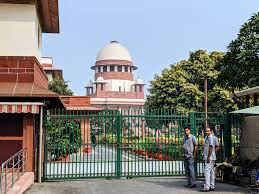Filed by the appellant against the judgment and decree of the trial Court was upheld. (Para 1)
A notice dated 24.11.1978 was got issued by the father of the appellant to the vendee seeking execution of the Conveyance Deed back in favour of the vendor in terms of the Reconveyance Deed executed on 24.12.1973. The same was replied to by the vendee- Rudramma through her counsel on 02.12.1978 stating that the Sale Deed dated 24.12.1973 was not a mortgage by conditional sale. It was an outright sale of the property. (Para 3)
A suit was filed by Ganagaramaiah seeking permission from the Court to mortgage the property of the minor. A public notice was issued inviting objections. Vide order dated 27.09.1978 permission was granted to execute fresh Mortgage Deed in order to discharge the earlier mortgage for a sum of Rs. 7000/- (Rupees Seven Thousand). On 26.03.1987, the legal heirs of Rudramma sold the property in-question in favour of defendant no.4 in the suit, namely, N. Shashidar. Gangaramaiah died on 30.04.1987. (Para 4)
The prayer in the suit was for redemption of the mortgage. On interpretation of the documents, it is clearly made out that the intention of the vendor was to mortgage the property. (Para 6)
A perusal of the aforesaid proviso to sub-section (c) of Section 58 of the 1882 Act4 provides that no transaction shall be deemed to be a mortgage, unless the condition is embodied in the document which effects or purports to effect the sale. It is the undisputed case in hand that it was not a single document, the conditions contained wherein have to be considered by this Court to opine that the transaction was not a sale, but a mortgage. Admittedly, there are two separate documents. (Para 24)
In terms of the Sale Deed and the Reconveyance Deed, reconsidered in the light of the enunciation of law, as referred to above, in our opinion, the same cannot be held to be a transaction of mortgage of property. Sale of property initially, was absolute. By way of execution of Reconveyance Deed, namely, on the same day, the only right given to the appellants was to repurchase the property. (Para 31)
SUPREME COURT OF INDIA
2023 STPL(Web) 190 SC
[2023 INSC 743]
Prakash (Dead) By Lr Vs. G. Aradhya & Ors.
Civil Appeal No. 706 of 2015-Decided on 18-8-2023
https://stpllaw.in/wp-content/uploads/2023/08/2023-STPLWeb-190-SC.pdf







